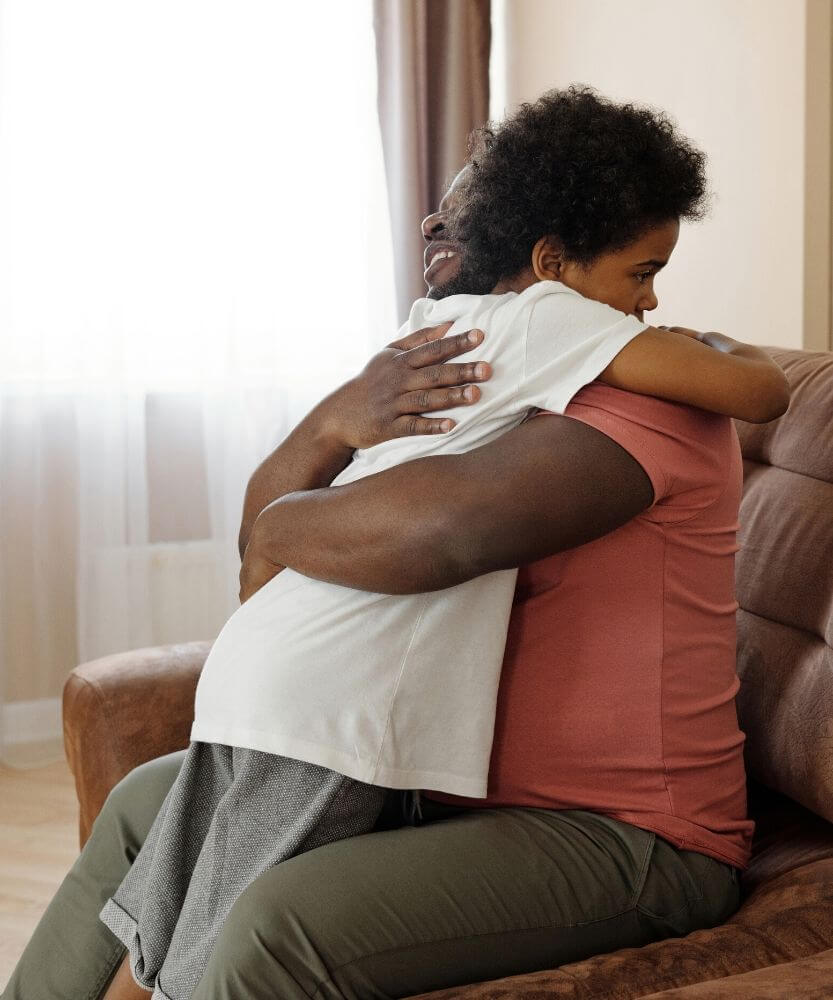Watch the video above to learn from Dr. Fawn McNeil-Haber about how to talk with your child about scary thoughts. Below, you’ll find the highlights, some practical tips, and ways to get your child more support with child anxiety treatment.
How to Talk to Your Child About Scary Thoughts
As a parent, it’s our instinct to want to protect our children, especially when they are afraid. But, it’s hard to know what to do when your child comes to you with a big scary thought. A thought that catches you off-guard and frankly frightens you as their parent. You may find yourself wondering why they’d think such a thing? Or, you may question if it’s something you should be concerned about? Today, I want to talk about scary thoughts and offer you some tips to help you talk to your child.
Let’s talk about what scary thoughts are, and what they mean
Are they something you should be concerned about? Not necessarily. We all have intrusive scary thoughts from time to time. For example, have you ever been to the subway? Have you ever wondered what would happen if you stepped off the curb? It’s scary, you probably wondered “Why did I just think that? Oh my goodness!” Then, you probably shook your head and moved on. Sure, it was uncomfortable, but after a few hours, it was not on your mind anymore. That’s pretty normal. And, children experience thoughts like these too.
In fact, a recent study states that 47% of kids experience scary thoughts or worries. But, as a psychologist who specializes in helping children, I believe it’s actually much more prevalent. Depending on the age of the child, scary thoughts may vary. However, some common examples include: their house catching on fire, their parents being harmed or hurt, worrying about parental divorce or death, fear of becoming very sick, or even something sexual.
Adults get anxious and have scary thoughts too.
Just like you may have felt afraid when you experienced a similar scary thought, your child may feel the same sense of discomfort or even embarrassment. They may be unsure of what this thought means. And, it may be very upsetting to them. So, as parents or caregivers, it’s important to know how to help your child when they experience distressing thoughts.
Helping your child’s anxiety is proactive
First things first, it’s important to be proactive and help your child feel comfortable coming to you when they have a scary thought and feel unnerved. The best way to do this is to be very open with them and even talk about topics that feel taboo. Like curse words or puberty for example. When a child knows that they can come to you, it will help these thoughts become less important. Furthermore, it will reinforce the fact that they can talk to you about things no matter how embarrassing or scary they may be. This offers them a sense of security and acceptance that’s really important.
When your child comes to you and shares a scary thought it’s important to keep a few things in mind.
First, don’t overreact or become alarmed.
Remember, a scary thought does not typically mean there’s something wrong with your child. Please avoid using phrases like “how could you think that?” Reacting in such a way reinforces a sense of shame around these thoughts. It makes a child think that there’s something wrong with them or their mind. Also, it shows them that these thoughts are scary to you. Your child naturally wants to please you, so this reaction will decrease the likelihood that your child will come to you in the future to confide in you.
When they do share a scary thought with you, your initial instinct may be to put a bandaid on their pain and offer empty reassurance.
For example, you may say “you’re fine” or “don’t worry about things like that.” This reaction reinforces that what they are thinking is wrong or silly. Instead, simply acknowledge what they’re saying and let them know that you appreciate them telling you about what they’re thinking.
Don’t tease or mock your child for having scary thoughts.
And, do not make light of what they’re experiencing. Doing so is extremely invalidating to your child. It will also decrease the likelihood that they would come to you in the future for fear of being teased. It may feel light-hearted to you but it might not to them. When you’re being vulnerable with someone and sharing, you wouldn’t want to be teased.
Lastly, please remember that the most important thing is that they are sharing their scary thoughts with you.
Don’t place too much importance on them. Take the fact that they are coming to you seriously, and if possible use the six tips below to help them cope with the thoughts they’re having.
Six Things You Can Do To Help Your Child Who’s Having Scary Thoughts
Tip 1: Normalize that scary thoughts happen
Remember, lots of people have scary thoughts that pop into their heads from time to time. Yes, they probably make you feel momentarily uncomfortable and ill at ease. But, it doesn’t mean that there’s anything wrong with you. The same goes for your child. Helping them normalize these thoughts is important because it provides them with reassurance and confidence that they can come to you and discuss any future concerns they may have.
Tip 2: Look into the source of the scary thought
It’s important that we help children connect their scary thoughts to a source if there is one. For example, if a child is scared of germs, it could be caused by the COVID-19 pandemic. Or perhaps, your child’s classmate survived a fire, and now your child is scared of the fireplace or afraid their house will catch on fire. Remember, fear is a common response to new situations.
Tip 3: Look for evidence for or against the scary thought
Arm your child with evidence regarding their scary thoughts. This not only gives them the facts but can provide them with the reassurance that they’re not thinking anything wrong. For example, perhaps your child is scared to fall asleep because they worry someone will break into their house. Ask them, has that happened to you or someone you know? Are we careful about locking the doors? Allow them to determine for themselves if there’s substantial evidence to justify their fear.
Note: this one can be especially helpful for children going through puberty who are experiencing distressing or scary sexual thoughts. This time in a child’s life is full of changes, physically, mentally, and emotionally. As they start experiencing new thoughts and bodily sensations they might question whether something is wrong with them or wonder if these new experiences are inappropriate. Arming them with resources explaining puberty (books, videos, etc) can help them, understand how their body is changing, explain what to expect, and what’s natural.
Tip 4: Remind your child that thoughts are just visitors. They don’t stick around forever.
A child I was working with once shared with me a powerful analogy that I want to share with you now. When I was explaining that sometimes scary thoughts just pop into our head, they said “oh like they came to a party and left.” I thought, YES. This! Scary thoughts arrive, they visit for a bit, then they move on and leave when they’re ready. You don’t have to give these thoughts attention or talk to them. They’ll eventually go away. Fighting these thoughts and trying hard to push them away can give them power and even make them bigger. So, just let them be.
Tip 5: Remind your child that thoughts are just WORDS
Thinking of thoughts like words on paper takes away their power. Think about it. “I am afraid of getting in a car accident and dying.” That’s a scary thought. But, what if you mixed up these words “‘I’m a car getting in afraid and accident of dying.” That sentence seems rather silly, doesn’t it? Is it still scary? Doing this exercise can help your child disconnect from the scary thought they are having and it reminds them that their thoughts don’t predict the future or define who they are, they’re just words that can be scary or silly depending on how you arrange them.
Tip 6: Turn the thought into something silly. Also known as the “pink elephant tip”.
This one is similar to the last two tips, but this time you’re imagining the thought as an image. At first, this image may be something scary. BUT then all of a sudden a BIG PINK ELEPHANT pops into the frame. It stomps around, does a silly dance, eats some leaves. Does the thought still seem scary? Or does it seem a bit silly?
Another way you could accomplish the same effect, ask your child to imagine their thoughts on your TV or tablet screen. Then ask them to back up and get farther and farther away from it. Can they still see their scary thoughts? Did the thought go away? Ultimately, the purpose of this exercise is to distance the child from their thoughts and help them take away the scary thought’s power and control.
Parenthood is one of the hardest, most rewarding, and most terrifying jobs.
As a parent, I understand your instinct to be worried and concerned. But, remember, having a scary thought doesn’t mean your child will act upon them. Scary thoughts come, then they go away. Helping them reframe their thoughts can help them move on from them.
However, if you’re concerned about your child’s wellbeing, or if you’ve tried these tips and others but your child still seems to be preoccupied and stressed about these scary thoughts, I encourage you to talk to your physician or mental health professional. It’s possible that your child is experiencing anxiety or OCD that can be managed through psychotherapy.
The good news is childhood anxiety is very treatable. Child counseling can help your child learn tools and techniques like the ones we discussed above, to help them cope with anxiety symptoms. Learn more about our approach to treating childhood anxiety here!
Interested in Parent Counseling?
Contact us for a free video consultation.
(908) 242-3634 or Connect Now
Begin Child Anxiety Therapy in New Jersey With a Skilled Adolescent and Child Therapist
Brave Minds Psychological Services in Scotch Plains, and Branchburg, NJ helps adults, children, and families with parenting, health anxiety, and more. Let our skilled and caring family therapists provide a safe and comfortable therapy experience right here in New Jersey. To begin counseling for your child, there are a few simple steps:
- Connect with Brave Minds Psychological Services today.
- Get your questions answered in a free phone consultation call with one of our compassionate therapists.
- Feel more confident about your child’s mental health and success.
Other Therapy Services At Brave Minds Psychological Services
At Brave Minds Psychological Services, we offer a variety of services from our licensed therapists in order to get you on the right path to healing and wholeness. Our therapeutic services include therapy for children, anxiety treatment for children, child sexual abuse therapy, therapy for teens, anxiety treatment for teens, teen social phobia therapy, adult anxiety counseling, couples counseling, counseling for parents, postpartum counseling, birth trauma therapy, and sexual assault counseling for adults. We also have a blog where we write about a variety of different mental health subjects. If you’re interested in learning more about our services here at Brave Minds Psychological Services or online, please contact our Scotch Plains counseling office! Proud to serve Fanwood, Westfield, Cranford, New Providence, and surrounding areas.






One thought on “How to Talk to Your Child About Scary Thoughts”
Comments are closed.